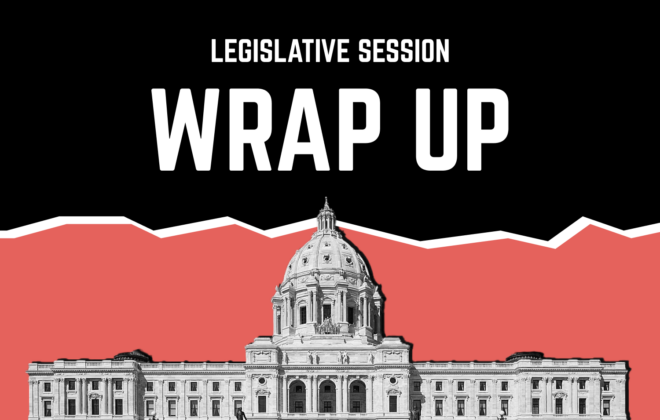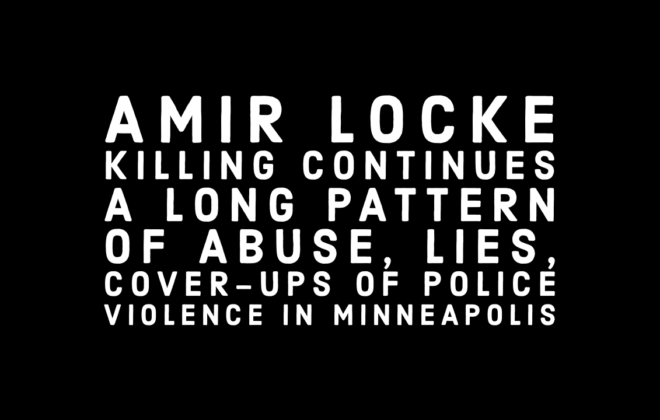City’s study confirms a $15/hr minimum wage would address inequalities in Minneapolis
Increase would lift wages for 71,000 workers while not harming business
Minneapolis, MN — Results of the city of Minneapolis’ minimum wage study show that a $15 minimum wage phased in by 2021 would lift wages for 71,000 workers, disproportionately Black and Latinx, with no significant differences to businesses’ operational costs (p. 57-71).
Guillermo Lindsey, one of the 71,000 workers in Minneapolis making less than $15, shared what raising the minimum wage to $15 would mean for his/her family.
“I work hard, yet because of low wages I struggle to pay for basic necessities like rent and food for my family. The CEO of Target makes $9,000/hour, but by organizing for $15 in Minneapolis, we can win,” said Guillermo Lindsey, a CTUL member and fast-food worker. “The study shows that passing a $15/hour minimum wage would have a dramatic impact on families like mine.”
The report shows that raising the minimum wage to $15 per hour would create tremendous economic opportunity for Minneapolis workers, especially the women and workers of color who disproportionately fill jobs paying less than $15/hour.
The report explores both a $12 and $15 minimum wage and found no significant differences to businesses’ operational costs. It projected the impact of raising wages gradually through the year 2021 (one year faster than the proposal with 68% support of Minneapolis voters). The study shows Minneapolis workers can lead the region, taking initiative to pass $15/hr first to put upward pressure on other cities and the state. The report shows the big business claims about unemployment, price increases and business closures are overblown. While the difference between $12 and $15 for business is nominal, it is clear that the positive effect on families in Minneapolis is far greater with $15 per hour:
- Over 71,000 workers would be immediately impacted by an increase in the minimum wage up to $15/hour, and several thousand more by the ripple effect of raising the minimum wage.
- 42% of black workers and 54% of Hispanic workers would directly benefit from a $15/hour minimum wage. Income for black workers would increase by 23% (pg 38). Income for Hispanic workers would increase 27%. Although workers of color are disproportionately affected by minimum wage, 51% of minimum wage workers are white and would see an annual wage increase of 19%.
- Working families below the poverty line would see a 50% increase in their income with a $15/hour minimum wage (pg 40).
- 29% of working single mothers would benefit from an increase in the minimum wage, and a $15 minimum wage would increase their annual salary by 22% (pg 52).
- Approximately 17,000 households would become food secure, leading to nearly a 7% drop in food insecurity (pg 168). Households with minimum wage earners would spend $27 more per week at grocery stores.
“This report shows that passing a $15 minimum wage by 2021 will be a tremendous step to reducing poverty in Minneapolis, and would especially provide economic opportunity for women and workers of color. The study counters the big business scaremongering about unemployment, price increases and business closures,” said Ginger Jentzen, Executive Director from 15 Now Minnesota. “Our growing coalition is unified around a $15 per hour minimum wage as a concrete policy to address racial and economic disparities in Minneapolis. Due to the crisis of poverty pay, workers are organizing for union rights and a voice in the workplace, and regardless of the city’s process for raising wages, low-wage workers and allies are organizing a massive grassroots campaign to win a $15 minimum wage for all Minneapolis workers.”
The coalition of organizations supporting the fight for a $15 minimum wage in Minneapolis include 15 Now Minnesota, ISAIAH, Neighborhoods Organizing for Change (NOC), Centro de Trabajadores Unidos en Lucha (CTUL), NAACP Minneapolis, AFSCME Council 5, Amalgamated Transit Union (ATU), Bakers (BCTGM) Local 22, Communication Workers of America (CWA) State Council, Minneapolis Federation of Teachers and ESP’s (MFT) Local 59, Minneapolis Regional Labor Federation (MRLF), Minnesota Nurses Association (MNA), National Association of Letter Carriers (NALC) Branch 9, People of Color Union Member Caucus, SEIU Minnesota State Council, Teamsters Local 320, UNITE HERE Local 17, United Food and Commercial Workers (UFCW) Local 563, and Working America.
Researchers will present their findings to the City Council Committee of the Whole on Wednesday, October 5 at 10 am in Room 317 of Minneapolis City Hall, 350 South 5th Street.
Related Posts
Categories
- Announcements (11)
- Childcare (8)
- Community Safety (10)
- Criminal Justice (18)
- Democracy (28)
- Economy & Jobs (27)
- Education (16)
- Environment (11)
- Faith (15)
- Health (22)
- Housing (30)
- Immigration (31)
- Islam (11)
- Newsletter (34)
- One Body (2)
- Other Issue Work (14)
- Public Safety (3)
- Report (7)
- Transit (19)
- Uncategorized (40)
- Working Families (18)



